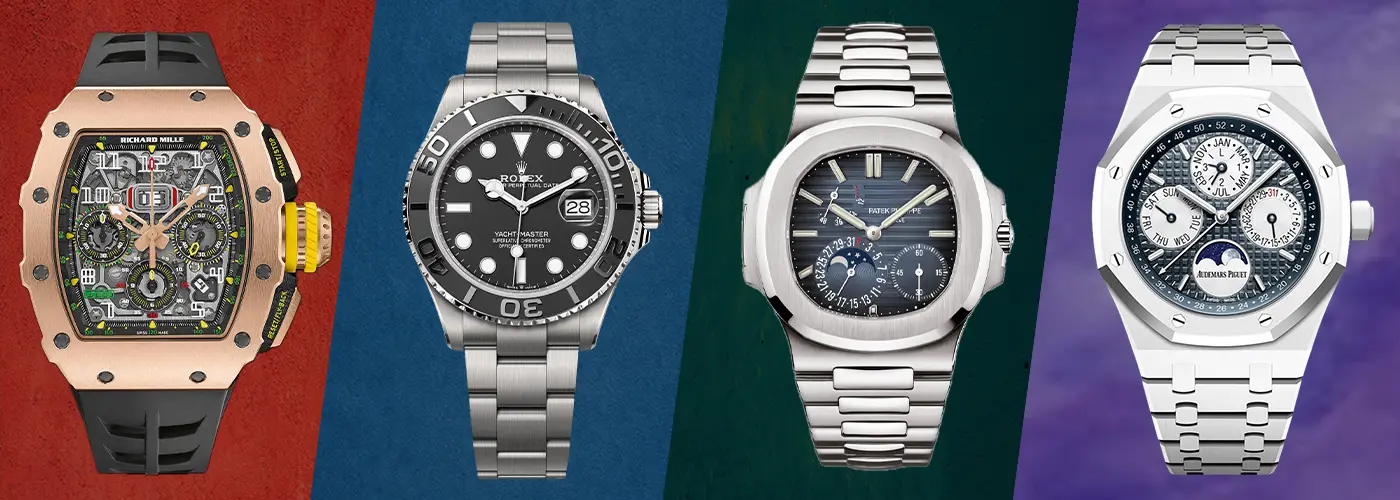Pros & Cons of Different Watch Materials
Have you ever wondered why these watch brands are experimenting with different materials and why they don’t stick to just one? It is because each of these material options bring their own set of pros and cons to the table. Here’s a list of each of the material options with their pros and cons to help you make an informed decision.
Ceramic Watches: The Colorful Approach
We have been seeing the usage of ceramic material in the watch industry since the 1960s. However, the material has become extremely popular in the past few years. Brands have had the chance to experiment with different colors for watch cases and bracelet. Over the past few years, we have seen some extremely impressive Hublot watches made from ceramic. Even though we have seen some absolutely stunning ceramic watches lately, the material does have its own set of flaws as well.
Pros of Ceramic
- Scratch-resistant material.
- It is both harder and lighter than stainless steel.
- Can be produced in a wide variety of colors.
Cons of Ceramic
- It can shatter in case of a strong impact.
- More complex to work with making the cost higher than steel watches.
Titanium: Lighter on the Wrist
Introduced to the world of watches back in 1970s, the use of this material has increased in the past few years. It is a rather durable metal that is much lighter than stainless steel or gold. It makes for the perfect material to be used on a watch as people prefer having a lighter watch on their wrist.
Advantages of using Titanium
- More resistant to scratches and dents when compared to steel and gold.
- It is Hypoallergenic making it a great choice for people with allergies to metals.
- Much more lightweight than other materials.
Disadvantages of using Titanium
- Generally priced higher than their steel counterparts.
- Difficult to polish due to its unique properties.
Also Read: 5 Popular Titanium Watches to Invest in 2024
Gold: Classic Luxury
The luxury and timeless elegance that gold brings, no other material would bring to the table. While yellow gold watches have been a popular choice among highly influential people, these are now also available in rose gold and white gold. I would prefer rose gold any day as yellow gold is not my taste and white gold just looks like steel unless you know what you are looking at. But for those who are considering buying any of the gold watches, here are the pros and cons.
Pros of Gold watches
- Offers a classic and timeless appeal.
- Has an investment potential as gold prices are only expected to keep rising.
Cons of Gold watches
- It is a softer metal, which makes it much easier to scratched or even get dents.
- Being a precious metal, it is usually a more costly option.
Also Read: Rolex Increases Prices of Gold Models for the 2nd time in 2024 – List of models affected
Stainless Steel: Durable Watches
Stainless Steel is one of the most common materials used in luxury watches. This material is known to offer the perfect balance between durability and affordability.
Pros of Steel Watches
- Relatively more affordable giving excellent value for money.
- High quality steel watches are resistant to corrosion.
- Easy to polish.
Cons of Steel Watches
- Probe to scratches and dents.
- No unique factor.
- Relatively less comfortable to wear in heat.
What Material Should Your Next Watch Be?
If more color options are what appeal to you, then you should not look at anything other than a ceramic timepiece. Those who prefer to have a rather lightweight watch, titanium is your best bet. Yellow gold, rose gold and white gold are extremely popular among people looking for the most premium material. However, as mentioned above, just like other materials, gold has its own set of disadvantages as well. Then there is the trustworthy option – stainless steel. It still remains one of the most popular options as it is a durable material and much easier to maintain than the other materials mentioned here.
While we have tried to compile this list using the most popular material options, these are not the only options out there. Another premium material is Platinum, which does add weight to your wrist, while also being way more expensive than all the other materials. Lately, we have seen some Bronze and Carbon Fiber watches picking up attention as well.
In a nutshell, whether to pick up a ceramic watch or stick to stainless steel, it ultimately comes down to personal preference. Each material offers unique benefits and drawbacks.
